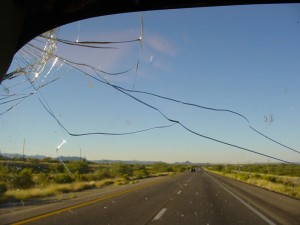Posted on 9/2/2014

Cars tout their safety features and reliability all the time, but windshields are usually overlooked by advertisers and salesmen. Understanding the structure and purpose windshields serve should be something all car owners are aware of. Structure All windshields are constructed of two layers of glass, laminated and tempered, with a sheet of vinyl placed between them. The vinyl fuses the glass together and is what keeps the windshield from shattering in the event of an accident. Aside from that, windshields are an integral part of the roofs stability. Assessing Damage Cracks and chips come in all shapes and sizes. And for all manner of reasons. If that dump-truck you followed to work this morning was full of gravel and some came flying into your windshield, check it out once you make it to your destination. Knowing if the windshield is chipped or cracked could save you a lot of money down the line ... read more
Posted on 9/2/2014
If you own a MO vehicle with a warranty, beware! Many dealers and manufacturers suggest that you need to get your maintenance services at a dealership in order to keep your warranty. That simply isn’t true! You can have your vehicle serviced at your trusted, local service center without affecting your warranty. A federal law, called the Magnuson-Moss Warranty Act, prohibits a manufacturer from voiding your warranty just because you got parts or services from a non-dealer. In fact, a manufacturer can’t require you to use their brand of oil filters, lubricant, or any other part in order to maintain your warranty protection. This protection is true for aftermarket extended warranties purchased on new or used vehicles. This protection also applies to leased vehicles. There are similar laws in Canada as well. If a manufacturer can prove that the replacement parts or service lead to a vehicle failure, they can void a portion of t ... read more
Posted on 9/2/2014
North Americans love their cars. And nothing goes with cars better than the road trip. Freedom from daily schedules, new sights and the open road – it’s great! But there’s nothing like car trouble to bring the fun to a grinding halt. Now you can’t always avoid problems, but you can take steps to reduce the probability of getting sidelined on your trip. The first step is to look at your trip plan from your vehicle’s perspective. What kind of roads will you be traveling – winding byways or super-highways? Mountains or plains? What weather conditions are you likely to encounter? How many miles will you travel? How much weight will you be hauling – passengers and luggage? Lugging a trailer or roof top carrier? Will it be dusty? Armed with the answers to these questions, you can start a trip inspection to help you prepare your Kansas City vehicle for your big adventure. A lot of our Kansas City customers prefer to go through this exercise with an automotive service advisor at Sallas Auto R ... read more
Posted on 9/2/2014
Motor oil is the MOST IMPORTANT fluid in your vehicle. Why you ask? First, the oil protects the motor from heat that comes from all the moving parts inside the engine. Oil also cleans the inside of the engine protecting it from corrosion. Most motor oils are made from petroleum crude oil processed into motor oil. With this type of oil we recommend an oil change every 3,000-3,500 miles. Why? Because the heat and pressure inside the engine degrades the oil and it becomes quite dirty from keeping the engine clean. If the oil is left to long it will start to sludge up. When your next oil change comes around all the sludge may not come out leaving you with build up or residue inside the motor and can cause parts to plug up or corrode. Synthetic oil is an alternative to the standard mineral oil motor oil and is used in many newer vehicles. Synthetic oil is made from chemically modified compounds (synthetic materials) and can offer several advantages to car owners who are lo ... read more
Posted on 9/2/2014
When buying a used car one thought always seems to surface even if it is never spoken, “when will this car need a repair or maintenance?” One way dealers will try to give you peace of mind in your decision is by offering an extended warranty. But before you sign on the dotted line make sure you know all the details. What is an Extended Warranty? After a designated time the manufacturer’s warranty on a vehicle expires. Most warranties tend to last around three years or three thousand miles. Some cars can even have multiple warranties that vary from comprehensive coverage all the way down to seat belt coverage. An extended warranty is a warranty that can be added to a vehicle once the first warranty has expired. But adding an extended warranty also means adding additional fees. And some fees may not be worth adding. Research When you are purchasing a used vehicle be sure to do y ... read more